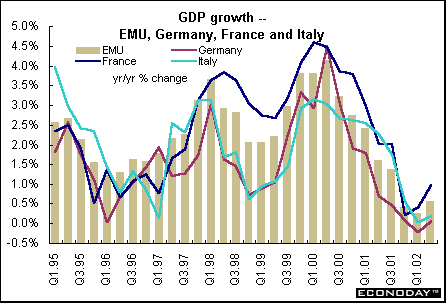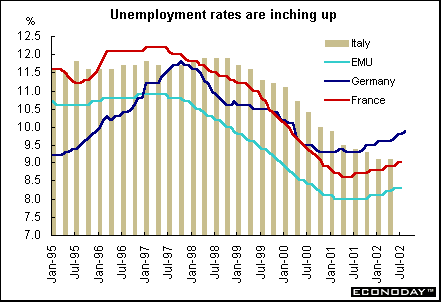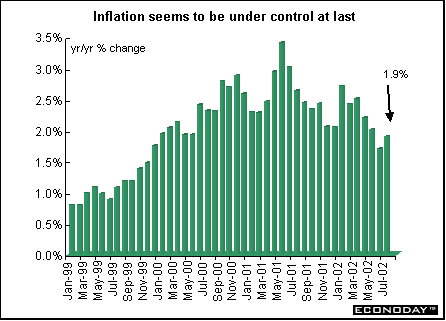The search for an economic leader (besides the United States)
One of the advantages expected for the European Monetary Union, especially after all 12 members began using the euro for everyday transactions, was a synergy between members that would enhance growth in all. Price differentials between member countries would disappear and competition would be intensified. This is hard to see right now. The EMU economy continues to barely expand as its engines of growth - Germany, France and Italy - barely eke by. Of the three, Germany has been the biggest drag on EMU growth.

The Eurozone (and Japan as well) lagged the U.S. by more than a percentage point in first-half GDP, with expectations that the gap will be wider in the third quarter. What GDP growth there is, has been stimulated mostly by exports, especially to the United States. It is no wonder that investors in Europe watch the unfolding of U.S. economic data almost more closely than U.S. investors!
While the vigor of the U.S. consumer has promoted global economic recovery, the failure of eurozone consumers to match this performance remains a key impediment to growth. The weakness of consumer spending is a bit puzzling. First-half consumption rose at 0.5 percent annualized compared with 2.5 percent in the United States. An inflation surge at the end of 2001 and continuing into 2002 could be behind much of the weakness. Inflationary expectations were particularly sensitive following the introduction of euro notes and coins at the beginning of this year. Although official statistics show that inflation has eased this year, consumers are not convinced and believe that business used the currency introduction as an excuse to increase prices - rounding up when converting from francs, lira, deutschmarks, drachmas, etc. to euros.
A stability and growth pact, at Germany's insistence, was established almost a decade ago. The pact's designers worried that the euro's credibility might be undermined by fiscal laxity among its members. Under the pact, countries must maintain a deficit below 3 percent of GDP, an original condition of becoming members, and must have a plan in place to balance the budget. Eight of the member countries have already eliminated their deficits. Much to their embarrassment, Germany and Portugal were the first two countries to receive warnings that their deficits were becoming dangerously close to breaching the 3 percent ceiling. Last month's floods and the skyrocketing costs resulting from them have exacerbated Germany's problem. At first it was suggested that the Bundesbank surplus should pay for the flood. That was quickly rejected. Then Chancellor Schröder was forced to postpone a tax reduction in midst of the national election scheduled for September 22nd in order to pay for flood relief. The stability pact also precludes deficit spending to ease economic conditions.
Weak growth undermines employment

Europe has always suffered from relatively high levels of unemployment because of structural rigidities in its labor market. Unions continue to be powerful in Germany, for example, with bargaining rules that favor labor. There are stringent rules pertaining to cutting the labor force and the rules are very costly to business. Periodic one-day strikes disrupted production earlier this year as unions pressed for gains far beyond those initially offered. Social benefits also give workers less incentive to go back to work. France, struggling to restructure its labor markets, reduced the workweek to 35 hours, causing headaches for industry. Further reforms are on the way. In Italy, the largest general strike in 20 years occurred in April. It paralyzed manufacturing, services and transportation. Triggering the strike was a government plan to make it easier for companies to fire employees.
Inflation under control

The European Central Bank has been reluctant to reduce interest rates because, until recently, the inflation rate as measured by the harmonized index of consumer prices (graph above) has exceeded its 2 percent ceiling. Another reason is the bank's need to continually confirm its credentials as independent, not swayed by the fiscal foibles of errant members. With virtually non-existent growth and government deficits almost reaching the 3 percent limit, politicians have been giving not-so-subtle hints that perhaps the bank should lower rates. But the ECB has stayed the course, leaving its key interest rates unchanged at last week's meeting.
BOTTOM LINE
Europe remains mired in a structural impasse. Germany, which once had been Europe's engine of growth, continues to stagnate, and this weekend's national election probably won't help. New ideas have not been forthcoming from either candidate with less than a week to go. The latest polls show that Chancellor Gerhard Schröder's SPD-Green government coalition has a slight lead over his conservative challenger Edmund Stoiber. A continuing economic malaise in Germany could hurt Europe's chances of becoming a viable investment alternative to the United States. Already this year, the Frankfurt DAX has plunged over 36 percent while the Paris CAC is down about 33 percent. In France, reform is taking hold reluctantly, while in Italy, little is changed. So what is an investor to do? Geographic diversification is important and investors need to look for opportunities despite the shortcomings. But remember, the United States continues to outshine them all when it comes to economic growth.
Anne D. Picker
International Economist, Econoday
|
![[Back To Archive]](../../../images/backtoarchive.gif)
